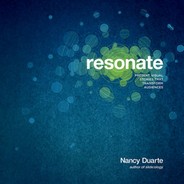184 Resonate
Thousands of the nation’s top scientists apply for the
Pioneer Award, sponsored by the National Institute of
Health. The winners usually have high-risk, high-reward
ideas that will transform how medical research is per-
formed. Finalists travel to Maryland to deliver a fifteen-
minute presentation followed by fifteen minutes of Q&A.
Presentations are delivered to a panel of top-notch sci-
entists who may or may not be in the same field of study,
which means the ideas have to be conveyed in a way that
resonates with a scientist in any field.
Markus Covert, PhD, assistant professor of bioengi-
neering at Stanford University, was the 2009 winner
of a grant for $2.5 million. He strongly believes that
the amount of feedback and practice he put into his
presentation is what sealed the deal for him.
Everything in Covert’s presentation had to justify his
hypothesis and warrant its funding. He needed to
include the big picture but also dive deep in places to
prove that he was knowledgeable. Covert challenged
a long-standing scientific-communication tradition
by incorporating emotional appeal in his presentation.
He wanted the tone to be inspirational in addition to
instructive—a brave departure from cerebral scientific
traditions. Adding such a visceral layer was counter-
intuitive; he knew even a thin veneer of emotional
Case Study: Markus Covert, PhD
Pioneer Award Winner
appeal would go a long way. So instead of focusing
solely on how, he included content about why his project
would change scientific research.
Knowing his approach was risky, Covert rehearsed the
presentation twenty different times with scientists in
various disciplines. Twenty. Following his very scientific
nature, he systematically presented over and over to sci-
entists from various backgrounds, collected feedback,
and modified the presentation to reflect their insights.
At times, it was a struggle to add material while remov-
ing pieces of which he’d become fond, but Covert took
a humble stance and was determined to embrace and
implement the feedback.
It wasn’t until he reached the nineteenth and twentieth
rehearsal that the feedback was “Don’t change a thing;
it’s perfect!” It was a lot of rehearsing, but he knew the
material, and delivery had to be just right.
There is much about science that is inspiring. Often, the
heartfelt passion gets buried in the facts and proofs.
By including emotion in his presentation and rehears-
ing it until it was just right, Covert won the grant. He
now gets to spend time in his lab pursuing his passion
instead of worrying where the funding will come from.
Factoid: Covert is using his grant funds to pursue the Holy Grail of biology, which
some have called the “ultimate test”—building a computer program that simulates
an entire cell. If successful, his research could revolutionize our understanding and
treatment of disease.
CH008.indd 184CH008.indd 184 8/16/10 6:17:30 PM8/16/10 6:17:30 PM

There's Always Room to Improve 185
Covert used a clean minimalist design for his slides. Many scientific
presentations clutter the slides with too much data. His were
perfectly balanced.
CH008.indd 185CH008.indd 185 8/16/10 6:17:30 PM8/16/10 6:17:30 PM

“The original energizing motor that makes me
compose is the urge to communicate—and to
communicate with as many people as possible.
Because what I love about the world and life is
people, I like them as much as I like music, if
not more. I love people, and I have a compul-
sion to share with people what I feel, what I
know, what I think.”
Leonard Bernstein
Leonard Bernstein
Conductor, New York Philharmonic
CH008.indd 186CH008.indd 186 8/16/10 6:17:39 PM8/16/10 6:17:39 PM
..................Content has been hidden....................
You can't read the all page of ebook, please click here login for view all page.
